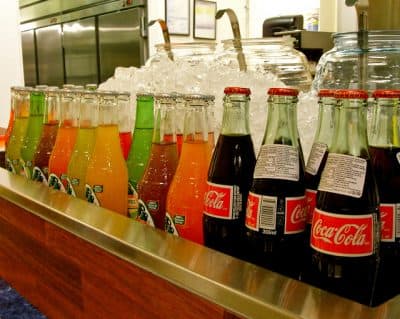Advertisement
Study: Sugary Drinks Solidly Linked To Obesity In Young Kids

Is it any shock? As documented in a study published online today by the journal Pediatrics, researchers at the University of Virginia found that pre-school-aged kids who frequently slug sugary drinks are at a greater risk of obesity.
This may seem to be a no-brainer, but leading up to the study was a murky landscape of conflicting opinions on the relationship of sugar-sweetened beverage consumption to young children's weight-status.
According to the study, when it comes to adolescents and school aged children, the consensus is pretty clear: increased sugary drink intake in this age group is associated with increased weight gain. But what about the younger set, children between ages 2 and 5?
Until now, that cohort had primarily been probed at the regional, cross-sectional level or even by a couple of studies funded in part by the beverage industry.
But in this study, researchers used the "Early Childhood Longitudinal Survey - Birth Cohort," an extensive data-set collected by the federal government that tracked 9,600 children born in 2001, following them from birth until they entered kindergarten.
They examined the effects of sugary drink consumption on young kids' weight both as snapshots at different documented ages and on the weight-gain patterns of subjects over time.
The study found that four and five-year-old kids who are regular drinkers of sugary sweetened beverages — defined as soda, sports drinks and fruit drinks that are are not 100% fruit juiced based, such as Kool-Aid or Sunny-D — were at greater risk of overweight and obesity as compared to those kids who never or infrequently imbibed in these drinks.
Though no clear link was established between regular sugary drink gulping and obesity for two-year-olds, according to the study, these kids experienced greater increases to their BMIs over the following two years as compared to the kids in the study with infrequent sugar sweetened beverage consumption.
Specifically, the kids in the study who were identified as regular sugary beverage drinkers had an average calorie consumption that was 17 to 20% higher than the kids who were infrequent sugary drinkers.
For the public health officials flipping through the study’s pages, the authors recommended that policies leading to decreased intake of sugary drinks in young kids be “strongly” considered. This recommendation is particularly timely with the recent fizzling out of the New York City soda ban that was stricken down by an appeals judge last week.
Despite, its unpopularity, Mayor Bloomberg stated that he will continue to push for his soda ban. Dr. Rebecca Scharf, an assistant professor of pediatrics at the University of Virginia and one of the study’s principal authors, said that as hard as it’s been to get the ban afloat, it’s worth the struggle.
“Similar to the smoking ban, what (the soda ban) does is it sets up a culture of promoting health that can be helpful,” she says. “Kids learn a lot of from the adults around them. I think it is beneficial when policies are created that set health expectations for diet and nutrition and help communities make wiser decision.”
Scharf and the other researchers behind this study found that the kids who were frequent drinkers of sugary refreshments tended to drink less milk than their counterparts and were more likely to watch two or more hours of T.V. daily.
The study’s authors suggest that this finding highlights the complexity of studying weight-gain, because it is a function of multitudinous, intermingling factors. Scharf said that these complexities make it difficult to establish concrete weight-related policy recommendations.
She agrees that soda is only one likely factor among many that contribute to childhood obesity, but that it’s worthy of being targeted through policy because soda-sipping is a variable that could actually be tweaked.
“Soda intake is modifiable,” she says. “So many factors that contribute to unnecessary weight gain cannot be changed, but (this) is something we can change. We can't fix everything, and targeting one aspect isn’t going to fix the problem, but we need to target factors that we can fix.”
Update: after this post was published, the American Beverage Association got in touch with their perspective on weight-gain and sugar sweetened beverage consumption amongst young children. They assert that because this was an epidemiological study, it cannot be established that sugary drinks cause childhood obesity and highlight the fact that the researchers only found an association between increased weight gain and frequent sugar sweetened drink consumption amongst young kids.
Here is their official statement responding to the study:
Overweight and obesity are caused by an imbalance between calories consumed from all foods and beverages (total diet) and calories burned (physical activity). Therefore, it is misleading to suggest that beverage consumption is uniquely responsible for weight gain among this group of children, especially at a time in their lives when they would normally gain weight and grow
This program aired on August 5, 2013. The audio for this program is not available.